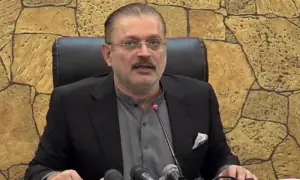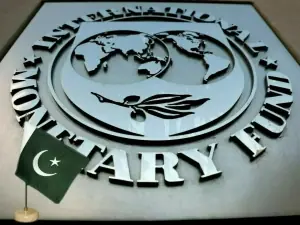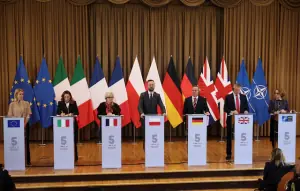Comprehensive plan chalked out to achieve inclusive growth: Finance minister
5 min readFederal Minister for Finance and Revenue Shaukat Tarin said Friday that the government had put in place comprehensive roadmap, focusing on 14 special sectors of economy, to ensure planned, inclusive and sustainable economic growth in the country.
Addressing a press conference, the minister said the last time such a strategy was presented was 1972.
They were presenting a strategy under which short, medium and long-term plans were being devised by working groups with the consultation of stakeholders and their implementation would be monitored.
The minister said that from September, performance in these 14 sectors would be monitored and prime minister would be given briefing about the execution of the plans every month.
“The exercise is aimed at accelerating growth rates from 3 to 6 per cent in three years,” he said, adding it would keep inflationary expectations subdued, generate employment opportunities, and reduce poverty by strengthening social safety net.
Hence, the minister said, the plans do not focus only on devising strategies but also on ensuring their implementation, which he said was unprecedented.
He said there were growth cycles of 4 to 5 years, but the country could not sustain it due to inconsistency, hence this strategy was aimed at bringing stability and sustainability in economic policies and performances. He said that making this comprehensive plan was the organized way of moving forwarded as is being practiced in developed countries.
“If there is no plan, everyone will go in a different direction and this will lead the country to nowhere,” said the finance minister, adding these short, medium and long term plans have been devised with the help of all stakeholders to move in right direction.
The minister said that economic experts of Pakistan Institute of Development Economics (PIDE) would be helping different ministries to implement the plan, hence there was no need to have fresh inductions in the ministry.
He said Economic Reform Unit at the Ministry of Finance would be facilitating these activities.
Talking about the performance of economy, the minister said that the economic indicators were showing positive results citing Business Confidence Index (BCI) Survey that indicated that the overall BCI has increased by 59 per cent, adding that textile exports also went up by 17 per cent whereas the country was now exporting mobile.
Minister for National Food Security and Research Syed Fakhar Imam on Friday said the government was striving to ensure proper rate of returns to farmers for their produces to improve their living standards as well as maintaining sustainable agriculture growth in the country.
Imam said that special focus was being paid on upgradation of research institutions to bring the quality of local scientist at par with international standards for benefiting local extension and growers.
He said that proper policies of current government was bearing results as all major crop like wheat, rice, sugarcane, maize and other minor crops witnessed significant increase during last season, adding that due to timely announcement of minimum support price of wheat, local grain output increased by 2.2 million tons.
Meanwhile, other crops including rice output increased by one million tons, maize by 700,000 tons and sugarcane output also increased, he said adding that due to sustainable wheat output, local demand and supply would likely to remain on smooth position.
The government had announced intervention price for cotton crop after 8 years, he said adding it would encourage and protect the local farmers and help in enhancing its output as cotton was an important cash crop of the country and a vital source of raw material for local industrial sector.
Imam said that government was striving to ensure the provision of inputs on affordable rates, besides extending the outreach of research and extension services to the doorstep of farmers, adding that it was expected to achieve 10 million cotton bales during current season.
The minister said that agriculture sector was badly neglected by the all previous governments and was not included in national main stream from last 20 years, adding that agriculture sector was growing with an average of 4 per cent from 1960 and during last 20 years it was gradually on declining trend.
During last financial year, despite Covid pandemic, under the special directives of prime minister budgetary allocations for agriculture sector was increased, adding that measures were taken to promote mechanization of agriculture sector.
The government was also providing subsidies for the construction of water channels, purchase of laser land leveler, adding that in order to involve the large bulge of youth in agriculture, agriculture loans would also be provided under prime minister’s Kamyab Jawan Programme.
Abdul Razak Dawood said that his main focus was on raising exports which would help strengthening the country’s economy. He said the government had fixed the target for the country’s total exports at $38.7 billion during current fiscal year out which $31.2 billion export target is fixed for goods while the rest $7.5 billion for services sector.
“So far, we are on target in goods’ exports while we are also hopeful to achieve the services exports’ target,” he added.
The adviser noted that at present, pressure was mounting on the country’s imports which would be controlled.
He said the imports of the country were high because traditionally Pakistan always relied on trade that was not ‘Made in Pakistan’. “Now we are implementing the policy of ‘Made in Pakistan’.
The best example of which is that the number of locally manufactured mobile phones has now exceeded the phones that were imported,” he added.
In addition he pointed out that the industrialization in the country was increasing because of tariff rationalization. “The government has waived off the tariff on 50 per cent raw material for enhancing the manufacturing of the country,” he said.
Minister for Industries Khusro Bakhtyar said that due to Covid outbreak, manufacturing and production sectors were badly dented around the globe and in Pakistan as well.
He said despite the pandemic, the country’s Large Scale Manufacturing (LSM) growth managed to grow by historic 15 per cent in fiscal year 2020-21 which was the highest in 10 years.
He said keeping in view the higher LSM growth, the country’s Gross Domestic Products (GDP) growth which remained 3.7% in the previous year could go up to 4.5% when the final figures would be calculated.
The minister informed new industrial sectors would be introduced that would help raising exports and substituting the imports of the country.
To a question about divestment process of Pakistan Steels Mills, the finance minister informed that the process was fully on track as the express of interests in this regards were being called by next week.
To another question with respect to Pakistan’s ongoing programme with the International Monetary Fund, the minister said the programme would not be called of and it would continue as per plan.
For the latest news, follow us on Twitter @Aaj_Urdu. We are also on Facebook, Instagram and YouTube.





















Comments are closed on this story.